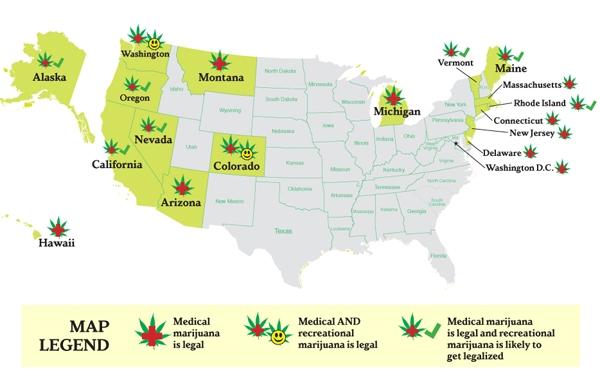The voters of Colorado and Washington recently passed initiatives that legalize cannabis for recreational use, leaving many Californians wondering how they got left behind.
After all, California led the country in cannabis policy reform in 1996 when voters passed Proposition 215, legalizing the plant for medicinal use for the first time since prohibition laws were established in the 1920s. Some Californians say legalizing cannabis for recreational use on a state level would solve a mess of problems associated with the industry. Others are less optimistic.
The problem is making it equitable, said Margaret Swearingen, Santa Rosa Junior College administration of justice and public safety instructor. Swearingen said California’s Proposition 19, designed to legalize cannabis for recreational use in 2010, failed to outline a reasonable system for regulating the industry it would have created had it passed.
“Any time you decriminalize something you have to set up a regulatory agency. The question is, how do you get that level of regulation in a recession?” Swearingen said. “Legalizing cannabis would reduce the resources used by law enforcement and the courts prosecuting or pursuing cases, but it’s not going to eliminate jobs. It would be a re-allocation of resources.”
Opponents of Proposition 19 argued that legalizing cannabis in California would have numerous negative consequences, citing current federal laws that ban the drug without exception, and criticized the measure for failing to include accompanying tax proposals.
The general estimate for an average felony marijuana prosecution is around $10,000, said The general estimate for an average felony marijuana prosecution is around $10,000, said Dale Gieringer who has a doctorate from the Stanford Department of Engineering-Economic Systems and works as director and state coordinator of California NORML.
The state would save more than $200 million in law enforcement costs for arrest, prosecution, trial and imprisonment of marijuana offenders and generate between $770 and $900 million per year in tax revenue Gieringer said. “We still have to see what the federal government will do in response to Colorado and Washington.”
The answer to that question may be coming soon.
“We’re still in the process of reviewing both of the initiatives that were passed,” said Attorney General Eric Holder at a morning appearance, answering a question from Colorado Attorney General John Suthers. “I would say, and I mean this, that you’ll hear soon.”
The medical marijuana industry in California serves an estimated 750,000 patients, or 2 percent of the population, according to California NORML. Even higher numbers were reported by the Peace in Medicine collective in Sebastopol, California whose members make 3.6 percent of local residents. How would legalizing cannabis for recreational use affect the medical cannabis industry?
“If legalization were to occur, Peace in Medicine would certainly welcome non-medical users while maintaining our current dedication to helping educate our customers on the safe, effective and responsible use of this medicinal plant,” said Johnny Nolen, general manager of Peace in Medicine.
“We understand that the greatest danger associated with cannabis use is incarceration or legal prosecution, and recognize that legalization would save millions of dollars in local, state and federal law enforcement expenses as well as thousands of individuals from the legal nightmare that comes from a cannabis infraction.”
The voters of Sebastopol recently elected Robert Jacob, owner of Peace in Medicine as vice mayor. In an email correspondence, Jacob said he’s hopeful that patients’ rights will be expanded on a state or even a federal level in coming years.
Jacob recently visited congressional representatives in Washington D.C. to advocate for HR 710 and HR 689, legislation that could end the federal conflict with state medical cannabis programs.


